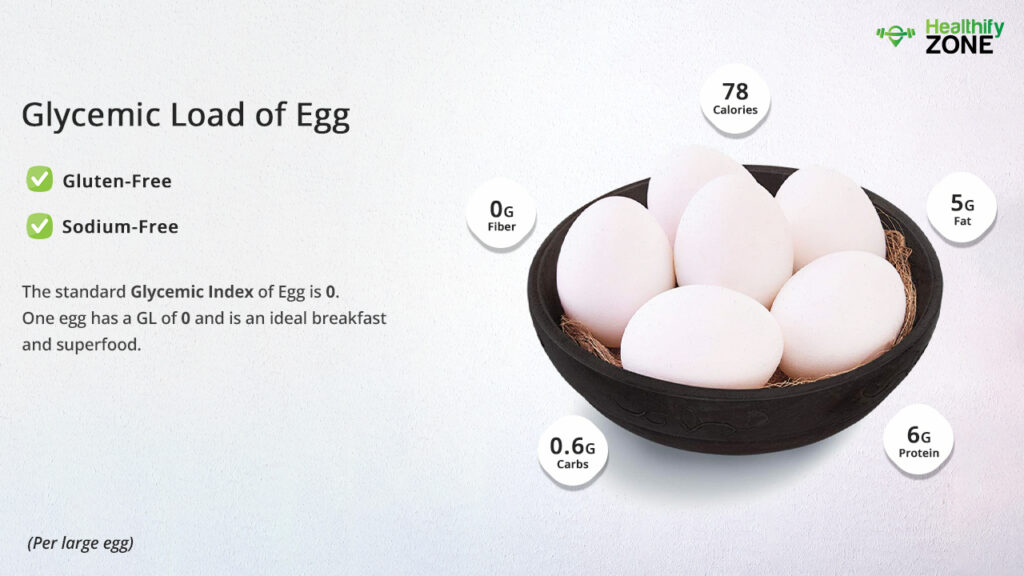The measure of carbohydrates present in a food item with the pace with which it increases the blood glucose levels is called the Glycemic Load. A simple way of making healthy diet choices is following the Glycemic Index, which shows you alternative sources of nutrients according to blood glucose levels for easy comparison. Glucose represents a higher blood glucose response in comparison to fructose.
Eggs are known to be the powerhouse of protein and are extremely versatile in nature, i.e. they can be cooked and eaten in several ways. The International GI Tables have found that Eggs have a Glycemic Index of 0. It is one of the very few food items that can truly be classified as ‘super food’. They are incredibly nutritious and some of the nutrients are very rarely found in the modern diet.

Egg and Egg Whites are the most nutritious food on the plant and they have every bit of nutrients that humans need like:
- Vitamin A
- Folate
- Vitamin B5
- Vitamin B12
- Vitamin B2
- Phosphorous
- Selenium
- Vitamin D
- Vitamin E
- Vitamin K
- Vitamin B6
- Calcium
- Zinc
- Protein
How to Calculate Glycemic Load of Egg and Egg Whites?
The standard Glycemic index of egg and egg whites is 0. The high glycemic index of the foods helps in reducing the risks related to cardiovascular diseases. If we want to talk about diet, the key to prevent diabetes or any chronic illness is to distribute the carbohydrate consumption content throughout the day and manage the sugar levels in the body correctly—however, the glycemic load for one whole egg and egg whites is 0 which makes it an ideal food.
The Formula/Procedure For Calculation of Glycemic Index of the Egg and Egg Whites :
GL = GI * carbs / 100
where
- GL – glycemic load;
- GI – glycemic index;
- and carbs – the amount of carbohydrates in the portion.
| SL.NO | EGG and EGG WHITES BY WEIGHT IN (g) | GLYCEMIC LOAD |
| 1. | 100 g of Egg and Egg Whites | |
| 2. | 250 g of Egg and Egg Whites | |
| 3. | 500 g of Egg and Egg Whites | |
| 4. | 1 Kg of Egg and Egg Whites | |
| 5. | One Whole Egg and Egg Whites (2.5 to 3 Kg) | |
Is Egg and Egg Whites Safe to Consume If You Have Diabetes?
Eggs are an excellent choice for people who have diabetes. One large egg would have about half a gram of carbohydrate, which renders its GI and GL to be 0, so it does not raise your blood glucose levels at all. However, you must be careful with your consumption of eggs if you have diabetes because they have high cholesterol of about 200 mg. Even though it is considered a source of good cholesterol, it is best that you monitor your consumption if you have diabetes because it is linked with cardiovascular diseases. You can comfortably consume egg whites, but limit a whole egg to one each day.
Can I Eat Egg and Egg Whites During a Fat-Loss Diet?
You can eat egg and egg whites during a strict fat-loss diet. They are incredibly filling and very high in protein, which is the most satiating nutrient. On the satiety index, eggs score on the higher side, so it means that it efficiently increases the feeling of fullness and reduces calorie intake.
- You can have about two boiled eggs for breakfast, if you want to be on a fat-loss diet.
- It automatically makes you feel full and you consume lesser calories.
Can I Eat Egg and Egg Whites During a Low-Carbohydrate Diet?
You can comfortably have egg and egg whites during a low-carbohydrate diet. Each egg has less than a gram of carbohydrate, which is clearly very little and can be included in your low-carb diet.
Is Egg and Egg Whites High in Sugar?
100 g of the egg would have 1.1 g of sugar. This is certainly very little sugar. Also, the food does not have high carbohydrates. However, eggs do have a high amount of cholesterol which needs to be monitored.